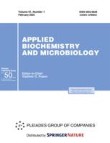
Abstract
The possible contribution of collateral enzymes to the formation of the key precursor metabolite, 3-hydroxybutyryl-CoA, has been evaluated in a recombinant Escherichia coli strain engineered for 1,3-butanediol biosynthesis from glucose via the inverted fatty-acid beta-oxidation pathway. Inactivation of the 3-hydroxyadipyl-CoA dehydrogenase gene, paaH, did not prevent 1,3-butanol biosynthesis during anaerobic glucose utilization by a strain with an intact, essential gene, fabG. This gene encodes 3-ketoacyl-ACP reductase, which can catalyze the conversion of acetoacetyl-CoA to (R)-3-hydroxybutyryl-CoA. The subsequent inactivation in the strain of the fadB gene, which encodes (S)-stereospecific 3-hydroxyacyl-CoA dehydrogenase of the fatty-acid beta oxidation led to the cessation of 1,3-butanediol synthesis. The respective diol was also not found among the products secreted by the strain possessing the intact fabG and paaH genes upon the individual deletion of the fadB gene. It was established that the collateral enzymes did not participate in the formation of 3-hydroxybutyryl-CoA in the studied strains, and the respective CoA derivative was synthesized solely by the (S)-specific enzyme of the fatty-acid beta-oxidation pathway. The results indicate that reversal of the fatty-acid beta oxidation pathway can ensure the enantioselective biosynthesis of the (S)-stereoisomer of 1,3-butanediol in engineered E. coli strains.



No comments:
Post a Comment